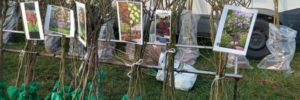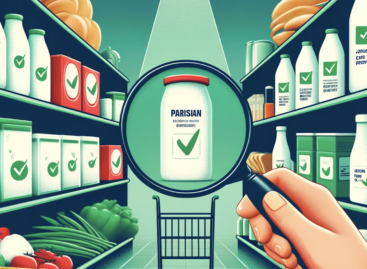Inspection of propagating materials at the Ónod fair
On November 2, Nébih held an on-site inspection with experts from the county government offices at the National Animal and Exhibition Fair in Ónód, during which, in addition to the destruction of more than a thousand unsuitable fruit planting materials, on-site sales were banned in several cases. The inspectors typically uncovered irregularities in connection with the sale of propagating material, the labeling of grape and fruit, and ornamental planting materials, as well as documents certifying the origin of the propagating material.

(Photo: Nébih)
The inspections carried out at the fair were carried out by several departments of the office with the involvement of county government offices and NAV staff. During the market inspection, the experts found propagating materials of unknown origin and problematic quality. In the case of more than a thousand fruit planting materials, the inspectors ordered the destruction on the spot and the immediate ban on sale.
The most problematic items – destroyed during the inspection – came from the black currant species
In several cases, experts were confronted with the fact that sellers offered black currants as magnolias or red currants. In the case of fruit grafts, irregularities occurred in the group of apple trees (apples, pears, quinces) and stone fruits (plums, cherries, cherries, apricots and peaches), and in the case of rose stems in the case of ornamental planting materials. The inspectors discovered several problems with the labeling of fruit trees. In many cases, the label was completely missing, which resulted in the immediate destruction of the propagating material. After checking its implementation, the authority obliged the distributors to eliminate the illegal situation. There were incomplete and contradictory data, as well as labeling in Polish and Romanian in several cases. In the case of foreign propagating materials, the inspectors found incomplete producer labels on several lots that did not meet the requirements for the data content of the plant passport.
In the case of rose stems, the lack of variety designation per stem was also typical
In many cases, color images were subsequently attached to only one large quantity of rose stems, and the documents certifying the origin were also missing, or at most they only contained the summary designations “rose” or “rose stem”. In the case of grapes, the inspectors found that the previous year’s official label was used improperly and not in accordance with the law on the batch planting material. In the case of containerized material, experts found a label with incomplete data.
In the case of all mentioned propagating materials, quality problems arose at the same time
In the case of fruit and ornamental plant propagating materials, in some cases the roots were not even covered with foil for the free-rooted items, in other cases the plants already showed signs of drying, but there were also cases of rose stems wrapped in sprouted roots, and in the case of packaging in foil bags with canes with dried, moldy or long etiolated shoots they had. Nébih will continue to take the necessary steps to eliminate illegal distribution in the future, with the involvement of partner authorities.
Nébih
Related news
A restaurant in the second district was closed with immediate effect due to serious hygiene problems
The Hungarian National Food Chain Safety Office (Nébih) has immediately…
Read more >Nébih experts examined the cheapest foods
In order to protect consumers, the National Food Chain Safety…
Read more >Nébih revealed serious food safety and hygiene deficiencies in a restaurant in the capital
The inspectors of the National Food Chain Safety Office (Nébih)…
Read more >Related news
The latest issue of Trade magazin is out now!
The digital version is available with more content once again…
Read more >FAO: global food prices increased for the second month in April on a monthly basis
In April, global food prices rose for the second month…
Read more >ALDI is reducing the price of fresh meat and frozen meat products
ALDI continues its price reduction: from the beginning of May,…
Read more >







